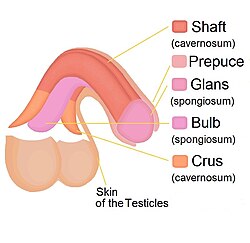| Body of the penis | |
|---|---|
 Diagram of penis. Body (labeled as shaft) at the top. Diagram of penis. Body (labeled as shaft) at the top. | |
 The constituent cavernous cylinders of the penis. The constituent cavernous cylinders of the penis. | |
| Details | |
| Precursor | Genital tubercle |
| Part of | Penis |
| Identifiers | |
| Latin | corpus penis |
| TA98 | A09.4.01.003 |
| TA2 | 3664 |
| FMA | 18249 |
| Anatomical terminology[edit on Wikidata] | |
The body or shaft of the penis is the free portion of the human penis that is located outside of the pelvic cavity. It is the continuation of the internal root, which is embedded in the pelvis and extends to the glans. It is made up of the two corpora cavernosa and the corpus spongiosum on the underside. The corpora cavernosa are intimately bound to one another with a dorsally fenestrated septum, which becomes a complete one before the penile crura. The body of the penis is homologous to the female clitoral body.
Structure
The body of the penis is suspended from the pubic symphysis. It has two surfaces; the dorsal and the ventral or urethral. The penile raphe runs on its ventral surface.
The body is surrounded by a bi-layered model of tunica albuginea in which a distal ligament buttresses the glans penis and plays an integral role to the penile fibroskeleton, and the structure is called "os analog", a term coined by Geng Long Hsu in the Encyclopedia of Reproduction. This indispensable structure is a continuation of the body of the human penis, differing from other mammalian penises, in that it has no baculum (or erectile bone) and instead relies exclusively on engorgement with blood to reach its erect state. It is a remnant of the baculum that evolved likely due to change in mating practice.
A shallow groove, which marks their junction on the upper surface lodges the deep dorsal vein of the penis, which is flanked by a pair of cavernosal veins of the penis, while a deeper and wider groove between them on the surface below contains the corpus spongiosum. The body is ensheathed by fascia, which includes tunica albuginea, Buck's fascia, dermis, and skin.
See also
Additional images
References
- "Penis anatomy: Functions and common conditions". www.medicalnewstoday.com. 2021-06-14. Retrieved 2023-03-13.
- "The Penis - Structure - Muscles - Innervation - TeachMeAnatomy". teachmeanatomy.info. Retrieved 2023-03-13.
- ^ Hsu, Geng-Long; Liu, Shih-Ping (2018). "Penis Structure". Encyclopedia of Reproduction. pp. 357–366. doi:10.1016/B978-0-12-801238-3.64602-0. ISBN 9780128151457.
- Rodgers, Joann (2003). Sex: A Natural History. Henry Holt and Company. p. 92. ISBN 978-0-80507-281-5. Retrieved September 29, 2023.
- Gormley-Fleming, Elizabeth; Peate, Ian (2021). Fundamentals of Children and Young People's Anatomy and Physiology: A Textbook for Nursing and Healthcare Students. Wiley. p. 307. ISBN 978-1-11961-924-6. Retrieved September 29, 2023.
- Greenberg, Jerrold S.; Bruess, Clint E.; Oswalt, Sara B. (2014). Exploring the Dimensions of Human Sexuality. Jones & Bartlett Learning. p. 259. ISBN 978-1-44964-851-0. Retrieved September 29, 2023.
- "The Penis - Structure - Muscles - Innervation - TeachMeAnatomy". teachmeanatomy.info. Retrieved 2023-04-29.
- "Why Humans Lost Their Penis Bone". Science.
![]() This article incorporates text in the public domain from page 1249 of the 20th edition of Gray's Anatomy (1918)
This article incorporates text in the public domain from page 1249 of the 20th edition of Gray's Anatomy (1918)
This article related to the genitourinary system is a stub. You can help Misplaced Pages by expanding it. |

